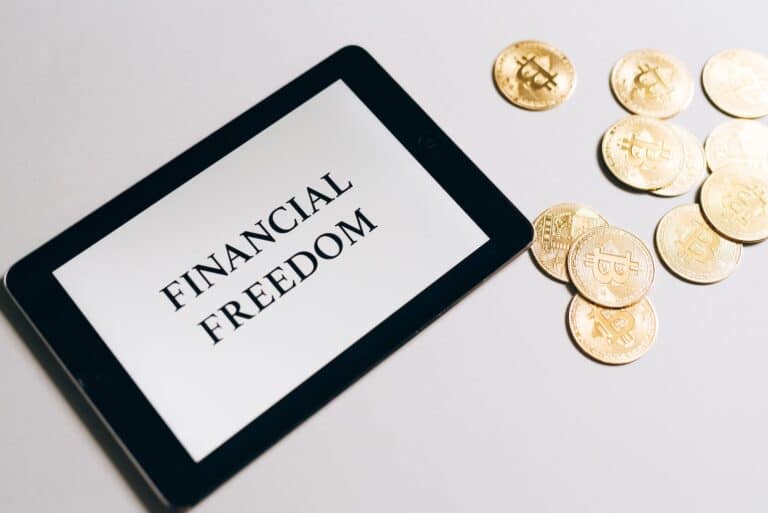Achieving financial freedom and wellbeing is like unlocking a new level in the game of life. It’s about more than just having enough money; it’s the peace of mind that comes from financial security and the power to make choices that align with your values and goals.
In this article, I’ll explore the multifaceted nature of financial wellbeing and the journey towards financial freedom. Whether you’re aiming for the independence that comes with the FIRE movement or simply seeking a greater sense of financial control, understanding the dynamics of financial wellbeing is crucial.
I’ll dive into the strategies and frameworks that can guide you on this path, tailored to your unique financial narrative. So, let’s embark on this journey together and discover how to measure, achieve, and maintain your financial wellbeing.
Understanding Financial Wellbeing

The Foundation of Financial Freedom and Well-Being
When I delve into the topic of financial wellbeing, I’m really talking about more than just the balance in a bank account. It’s the intricate dance between managing personal finances, breathing easy with financial stability, and the ability to enjoy life without the nagging worry of financial stress. Achieving financial wellbeing forms the cornerstone of financial freedom, allowing us to move through life with a sense of assurance that ongoing financial obligations will be met without scrambling for funds at the last minute.
Financial well-being varies from person to person, as each individual’s financial life is unique. Some of us may judge our financial health by our ability to save money for future life events, while others look at their capacity to splurge on a little extra without depleting their resources. It’s about having enough money to meet basic needs and to feel secure, both today and in the long term.
For me, this broader notion of financial wellbeing hinges on several pillars. Firstly, my ability to handle unexpected expenses signals a robust emergency fund. Next, the assurance that I’m on track with long-term planning—like retirement planning—fuels my confidence in my financial future. And let’s not forget the unmatched peace that comes with having a safety net, enabling me to weather the unpredictable nature of the stock market or sudden changes in my financial circumstances.
Cultivating Happiness Through Financial Freedom
The pursuit of financial wellbeing is intrinsically linked to the quest for happiness. Researchers exploring the wealth and happiness correlation have found that financial wellness and joy go hand in hand. When I have financial security and am not constantly fretting over money, I notice an uplift in my emotional well-being. There’s a profound calm that accompanies the knowledge that I can manage my finances without them managing me.
I’ve learned that financial literacy plays a pivotal role in this. Understanding money management principles not only helps me make more money but also teaches me how to use it better to support my overall wellbeing. Possessing financial knowledge is invaluable in achieving happiness through financial freedom. It empowers me to make choices that align with my values and to rise above the mere act of survival.
The Journey to Financial Freedom

Financial Freedom and Wellbeing: Where the Paths Cross
Many wonder about the relationship between wealth and happiness, often asking if more money truly translates to increased happiness. As I delve deeper into the nuances of financial freedom, it’s evident that the correlation between financial wellness and joy is far more complex than it appears. Happiness through financial freedom isn’t simply a product of accumulating wealth; it’s about the sense of financial well-being and security that comes from it.
Financial freedom means more than just having enough money to cover your bills; it involves creating a lifestyle where your financial situation supports your aspirations and allows you to enjoy life free from financial stress. It’s where financial stability and emotional well-being intertwine, shaping an overall flourishing financial future and the inherent joy that comes with it.
When I speak of my personal finances, I emphasize the goal of reaching financial independence, which isn’t just a dream but a tangible state where ongoing financial obligations no longer dictate the rhythms of my life. Whether it’s long-term planning, retirement planning, or building an emergency fund, each stride toward financial health brings me closer to a reality where I can make life choices without monetary constraints.
Financial Freedom: A Measure of Wellbeing
To achieve financial wellness, it’s crucial to understand that financial well-being varies from person to person. My journey towards financial well-being has taught me that a deeper understanding of money management is the keystone to securing a financial life free from undue worry. By becoming financially literate and seeking the counsel of a financial professional, I’ve begun to unlock levels of economic well-being previously unattained.
This process isn’t just about stashing away more money but about how I handle life events, stock market fluctuations, and long-term investing decisions. I’ve learned that basic needs must be met, but beyond that, the ability to save money and feel secure in my financial choices propels my happiness and contributes to my overall well-being.
Achieving Financial Security: A Lifelong Endeavor
As I progress further in my journey, my financial goals evolve, leading me to explore new avenues of financial support. Working with a financial planner, delving into financial literature, or even joining a personal finance course has equipped me with invaluable financial knowledge. This knowledge is a critical asset in navigating the unpredictable currents of my financial circumstances, allowing me a chance to enjoy life’s luxuries without jeopardizing my long term stability.
Exploring the FIRE Movement

The FIRE Movement, standing for Financial Independence, Retire Early, has sparked considerable interest among those yearning for a definitive break from ongoing financial obligations. I’ve delved into its rising popularity, noting a profound shift in how financial freedom and well-being are perceived, especially among younger generations who define wealth not just in terms of having enough money but through the lens of personal finance that enables early retirement and financial independence.
Striving for Financial Wellness and Joy
When discussing financial wellness, I’ve found that it’s not solely about amassing more money; rather, it’s about achieving a state of emotional well-being where one feels secure in their financial future. It’s fascinating to observe how this movement offers a deeper understanding of the correlation between individuals’ wealth and happiness. Adherents to FIRE advocate for living frugally and investing in the stock market or other assets, which allows for long-term planning and the accumulation of wealth, fostering a sense of happiness through financial freedom.
Financial Freedom and Wellbeing
For many, the journey toward financial freedom isn’t just about reaching a certain number or hitting financial goals—it’s about reshaping their financial life and aligning their actions with a more fulfilling, joyous existence. The process empowers them to enjoy life without the financial stress that commonly plagues those who feel chained by their personal finances. This philosophy of financial well-being varies among individuals but often involves establishing an emergency fund, becoming financially literate, and embracing practices such as long-term investing—all fundamental to overall financial well-being.
Achieving Happiness Through Financial Freedom
Financial freedom transcends the mere concept of economic well-being; it represents life without the constraints imposed by financial circumstances. Those who’ve adopted the FIRE principles often experience an elevated sense of overall well-being. They’ve shattered the traditional paradigm of working until typical retirement age, choosing instead to save money aggressively and enable a lifestyle where work is optional much earlier in life.
Emphasizing financial security, the FIRE movement exhorts its followers to become financially literate and proponent of a lifestyle characterized by a calculated approach to money management. This path towards financial independence doesn’t just lead to having more choices and enjoying life—it’s intrinsically linked with a feeling of contentment knowing that one’s basic needs are well taken care of, and their future is secure.
Finding Financial Control
Achieving financial independence isn’t just about having enough money; it’s deeply connected to our overall well-being. My journey to financial freedom has taught me that true wealth lies in emotional well-being as much as it does in fiscal health. I’ve found that the correlation between wealth and happiness is undeniable, yet complex.
People often mistake financial freedom as simply being rich. But through my experiences, I’ve learned it’s more about financial security and the autonomy to enjoy life without the constraints of ongoing financial obligations. This overlap between financial wellness and joy creates a powerful dynamic. It has reshaped my perspective on what it means to be successful.
Financial Freedom and Well-Being
My central goal has always been to define financial freedom in a way that accommodates my personal values and happiness through financial freedom. For me, this means creating a buffer between me and life’s financial stresses—a safety net that allows me to pursue the things that bring me happiness. Financial well-being is not just a static state; it’s the ongoing ability to meet basic needs, feel secure in my financial future, and make choices that allow me to enjoy life to its fullest.
Financial freedom and well-being become tangible when I take control of my personal finances. I’ve become financially literate, understanding the intricate details of my financial life and how each decision influences my overall financial well-being. Besides, maintaining an emergency fund and investing in long-term planning like retirement are more than just savvy financial moves—they’re foundational to my overall well-being.
Financial well-being varies greatly from person to person. What works for me might not work for everyone. Still, common threads like money management, saving money, and finding the balance between immediate pleasures and long-term investing are universally beneficial. These practices form the bedrock of financial stability and by extension, pave the road to happiness through financial freedom.
Part of this control also involves knowing when to seek out financial support or consultation with a financial professional—someone who can offer a deeper understanding of complex financial circumstances or help navigate the stock market for long-term gains. Embracing the expertise of a financial planner isn’t a sign of weakness; rather, it’s an astute recognition that achieving financial security sometimes requires a collaborative effort.
Strategies and Frameworks for Financial Wellbeing
Achieving financial wellness is a multifaceted journey, one that requires careful planning and strategic action. As I delve deeper into the world of personal finance, it’s evident that Financial Freedom and Well-being are not just dreams but possible realities with the right approach.
Financial Freedom and Wellbeing: The Ultimate Goal
Embarking on the path to Financial Security often starts with understanding the wealth and happiness correlation. Studies have shown a clear link between Financial Wellness and Joy, where money, when managed well, can lead to a more fulfilled and less stressful life.
Maintaining your financial well-being involves much more than just accruing wealth—it’s about feeling in control of your financial circumstances and being Financially Secure enough to Enjoy Life to its fullest. For me, financial freedom means not just meeting, but exceeding my ongoing financial obligations without stress or anxiety. It means being prepared for unexpected life events and having the confidence that my financial health is robust enough to withstand economic downturns.
The Importance of Financial Literacy
To reach a state of overall financial well-being, Financial Literacy is instrumental. Knowing how to Save Money, understand the Stock Market, and engage in Long Term Planning and Retirement Planning empowers me to make informed decisions that enhance my financial future. Becoming financially literate is not an overnight process, but rather an ongoing commitment to gaining financial knowledge and applying it to my financial life.
Building a Tailored Framework
Let’s explore a structured strategy aimed at bolstering Financial Freedom:
- Identify Your Financial Goals: Clear goals act as a beacon, guiding my decisions and helping me measure progress.
- Craft a Budget: A budget is essential for tracking income and expenses, ensuring that I have enough money to cover my basic needs while allowing for savings and investment.
- Create an Emergency Fund: An emergency fund is the foundation of Financial Stability, providing a buffer against unforeseen expenses that might otherwise lead to financial stress.
- Invest in Your Future: Whether it’s through the stock market or other investment vehicles, long term investing can compound and help secure my financial independence.
- Seek Professional Advice: Consulting a financial planner can provide specialized knowledge and tailored advice that improve overall financial health.
Measuring, Achieving, and Maintaining Financial Wellbeing

The Importance of Financial Freedom and Wellbeing
In my journey through personal finance, I’ve come to appreciate that financial freedom and well-being are essential to a fulfilling life. Financial freedom not only relates to having enough money to cover basic needs but also extends to possessing the economic capacity to enjoy life on your own terms. Given its importance, accurately measuring and tracking financial well-being becomes critical.
To gauge the health of my financial situation, I often turn to constructs like the Financial Well Being Scale, a tool that helps shed light on where I stand in the realm of economic well-being. This scale guides me through reflective questions that assess financial security and preparedness for unexpected life events. It’s not just about the numbers but also how those numbers translate to my peace of mind.
Achieving a State of Financial Wellness
Achieving financial wellness is a journey that requires long-term planning and dedication. My goal is always to foster happiness through financial freedom, which means creating a life where financial stress is minimized. Steps I’ve taken towards this goal include:
- Establishing clear financial goals that act as a roadmap for my savings and investment strategies.
- Actively seeking financial literacy to enhance my financial knowledge and make informed decisions.
- Building a robust emergency fund to mitigate financial shocks and maintain stability.
By adhering to these principles, I’ve noticed a positive correlation between wealth and happiness. While financial well-being varies from person to person, the core tenets of sound money management practices remain constant.
Sustaining Your Financial Health
Once financial stability is achieved, maintaining it requires a continuous commitment to personal finance education and the discipline to stick to a budget. Having a financial planner or seeking financial support from a professional can be a wise move for those looking to manage their ongoing financial obligations more efficiently.
Investing in the stock market, considering retirement planning, or exploring other avenues for long term investing are strategies that can contribute to an improved overall well-being. When we save money, we don’t just prepare for the future; we also build resilience that allows us to feel secure in the face of volatility.
Final Thoughts on Financial Freedom and Wellbeing
Achieving financial freedom truly transforms life, granting peace of mind and the joy of living without monetary stress. I’ve lived the journey, and I can attest to the profound impact it has on emotional well-being. By embracing financial literacy, setting clear goals, and crafting a solid budget, you’re laying the groundwork for a secure future.
Remember, it’s the discipline to stick to your financial plan and the willingness to learn and adapt that will keep your finances—and as a result, your emotional health—in check. Invest in your future, seek advice when needed, and watch as your financial well-being scales new heights, hand in hand with your overall happiness. Here’s to your journey towards a life of financial serenity and well-being!
Other suggested articles:

